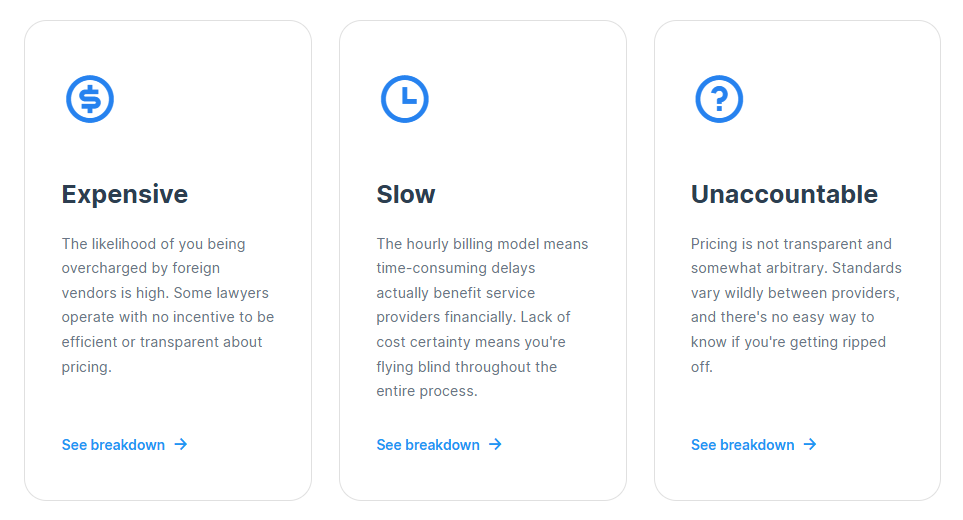Immigration and citizenship services cost $5,800–16,900 because the industry relies on analog workflows, fragmented providers, opaque pricing, and hourly-based legal models that reward inefficiency. Most cases could cost $2,000–5,000 with transparent fees, standardized workflows, document automation, and digital tracking. This guide explains the true drivers of cost and how modern platforms can fix them.
Why Do Immigration and Citizenship Services Cost So Much?
Most people assume the high cost comes from government fees or legal complexity. In reality, the expense comes from an outdated industry structure: scattered providers, manual documents, slow communication, and no transparency on timelines or pricing.

What Drives the $5,800–16,900 Price Tag?
1. Why are processes so slow, confusing, and expensive?
Immigration cases often involve 9+ different providers—lawyers, translators, apostille agents, couriers, researchers, and local attorneys. Each relies on manual systems, paper documents, and one-on-one communication, which inflates both time and cost. Delays accumulate because incentives favor billable hours over efficiency.
2. Why is reliable information so hard to find online?
Most online content is outdated, fragmented, or written by non-experts. Meanwhile, specialist lawyers hold private databases, personal networks, and insider knowledge that isn’t publicly indexed. This information gap forces consumers to rely on paid consultants, increasing the total cost of the journey.
3. Why do “country-specialized” law firms dominate the market?
Because every country uses different rules, timelines, and documentation standards, law firms position themselves as gatekeepers. Prices vary dramatically—Italian citizenship firms charging $3,000–8,000, for example—because there are no benchmarks, no published metrics, and no meaningful competition based on speed or quality.
What Is the Typical Cost Breakdown?
Processing time, often advertised as “3–6 months,” typically becomes 12–18 months under the standard industry workflow.
What Creates These Delays and Hidden Costs?
Hourly billing incentives
The traditional model rewards longer timelines, extra review cycles, and fragmented communication. Faster service is not in the provider’s financial interest.
Lack of standardization
Each provider uses different formats, instructions, and workflows. Consumers have to start from zero for each country, even when 70% of the process is identical.
Analog document management
Birth, marriage, and death records still move by mail. Apostilles require in-person handling. Many consulates still use legacy systems or manual appointment systems.
No price transparency
Most firms reveal final pricing only after a paid consultation, preventing meaningful comparison.
What Would a Modern, Consumer-Focused Model Look Like?
Transparent fixed pricing
Clear upfront costs per program and per country, replacing open-ended hourly billing.
Digital document automation
Structured data entry, reusable templates, and auto-generated forms reduce translation and apostille volume.
Standardized workflows
A global, repeatable playbook for 80% of the process, reducing case variability.
Real-time tracking
Status visibility that prevents follow-up calls, uncertainty, and delays.
Cross-country comparison tools
Let consumers compare timelines, costs, and pathways before choosing a program.
Resulting cost range: $2,000–5,000, not $16,900.
Conclusion
To compare citizenship-by-descent pathways, estimate real timelines, and plan your mobility strategy with clarity, start using the GlobalPassport™ platform today. Join GlobalPassport™ for free and build your personalized multi-country mobility plan.

Glossary:
Apostille: An international certification used to validate documents for foreign governments.
Vital Records: Birth, marriage, and death certificates used to prove lineage.
Translation (Certified): A legally recognized translation of government documents.
Jurisdiction Fragmentation: Variability between countries that increases complexity and cost.
Fixed-Fee Model: A transparent pricing structure that eliminates hourly billing uncertainty.
Author: GlobalPassport™ Research Team
Expert Review: Verified by immigration law specialists in EU and Latin America
Last Updated: November 2025
Compliance Note: Immigration rules change frequently. Always verify with official government sources before applying.
FAQs










Conclusion
.webp)
Interested?
Dive into the American Diaspora White Paper downloadable document now.
download WHITE PAPER
Need Help With your Application?
sign up for globalpassport
Design your mobility-asset plan
GlobalPassport Passportfolios curate ready-to-execute sets of programs that fit your goals and risk profile. Start with Graduate Magnets to spot post-study pathways and early-career routes in talent-friendly countries.
Explore Passportfolios


































.svg)
.svg)

